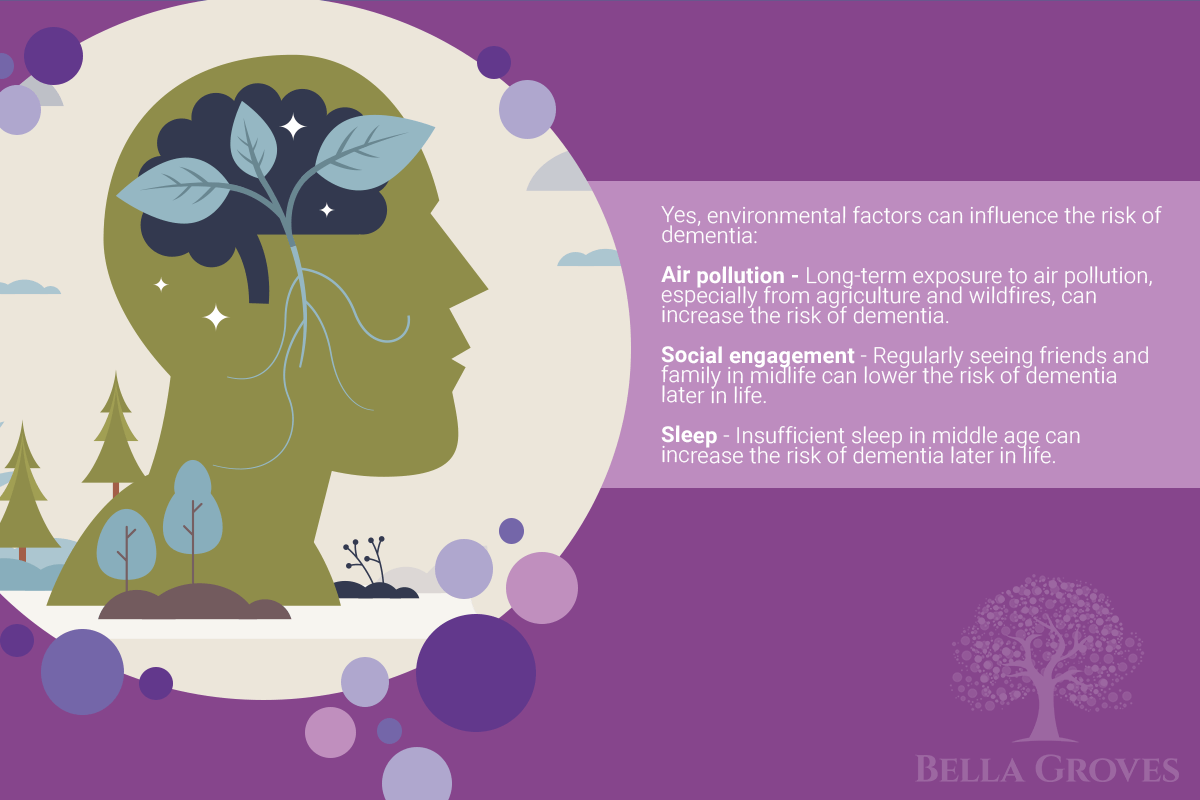
Can Environmental Factors Influence Dementia?
One of the most common questions we get at Bella Groves is about whether there are environmental or lifestyle factors that contribute to the development of dementia. For care partners and family members, understanding the factors that influence dementia’s progression is as much about protecting themselves as it is about helping their loved ones.
At Bella Groves, we believe that the best way to help others in their caregiving journey is to empower them with dementia education and invite them into a collaborative support network of other caregivers. To explore this question about environmental factors and dementia, we must begin as we always do with some baseline knowledge about dementia itself.
Understanding Dementia
Before we explore the environment’s role, it’s vital to grasp what dementia encompasses. Dementia isn’t a single condition but a broad term covering various cognitive impairments. Among the most recognized are Alzheimer’s disease, vascular dementia, Lewy body dementia, and frontotemporal disorders.
Each type has unique symptoms, but common threads include memory loss, challenges with communication, and difficulties in reasoning or judgment. Understanding the nuances of different dementia types can further help create a supportive environment that aligns with your loved one’s specific needs.
Ultimately, gaining a basic understanding of dementia’s landscape can empower care partners and family members to approach this health challenge with compassion and informed care. It sets the foundation for exploring how external factors might play a role in its development and progression.
Environmental Factors and Dementia
Research has increasingly pointed to environmental factors as key players in the development and progression of dementia. Air pollution is one such factor that has garnered attention. Studies suggest that pollutants, especially fine particulate matter, may impact brain health, possibly accelerating cognitive decline. For those living in urban areas, mitigating exposure to air pollution might be an essential consideration.
At Bella Groves, we partner with a company called Viking Pure Solutions, which allows us to produce non-toxic cleaning supplies. Our staff and residents can both safely use these cleaning and disinfecting solutions without being exposed to the harmful effects of harsh chemicals, allergens or fragrances.
Diet also plays a crucial role in cognitive health. Foods rich in antioxidants, healthy fats, and vitamins can support brain function, while diets high in processed foods and sugars might contribute to cognitive decline. The National Institute of Health published an article that drew a conclusion that ‘a higher intake of total sugar or total calories from sugar is associated with increased dementia risk in older adults.’
Mental stimulation is another significant environmental factor. Engaging in activities that challenge the brain—such as puzzles, reading, or learning new skills—can strengthen cognitive reserves and potentially delay dementia onset. Creating an environment rich in intellectual stimulation can be beneficial for loved ones at risk of or living with dementia.
At Bella Groves, we focus on person-centered activities to foster purpose and stimulate residents without leading to overwhelming emotional or behavioral expressions. For instance, painting for residents who are artists, engaging in play with baby dolls for those who have always been nurturers, washing dishes or helping prepare a meal, or something as simple as enjoying a walk outdoors. We strive to meet individual where they are, focusing on their strengths and interests.
The Role of Lifestyle Changes
Adapting lifestyle choices can serve as a valuable tool in mitigating the effects of environmental factors on dementia. By implementing certain changes, care partners can provide a more supportive and nurturing environment. Simple modifications, like improving air quality at home through ventilation or air purifiers, can make a noticeable difference.
Creating a dementia-friendly environment goes beyond physical adjustments. It involves fostering a space that promotes mental well-being and emotional safety. This can include incorporating calming colors, reducing clutter, and ensuring ample natural light. Each of these elements can contribute to a comforting environment that eases anxiety and supports cognitive function.
Active involvement in community activities and social engagements can also enrich the lives of individuals with dementia. Social interactions offer emotional benefits and mental stimulation, which are crucial for maintaining cognitive health. Encouraging participation in group activities, whether through clubs or classes, helps foster a sense of belonging and purpose.
Current Research and Future Directions
The scientific community continues to explore the link between environmental factors and dementia. Recent studies have highlighted the impact of urban living conditions on cognitive health and the potential protective effects of green spaces. These findings suggest that nature exposure might help mitigate some negative environmental influences on brain health.
Looking forward, research aims to uncover more about how specific environmental toxins and lifestyle choices interact with genetic predispositions to influence dementia risk. Understanding these intricate relationships could pave the way for more personalized interventions and preventive strategies.
Find Support at Bella Groves
By staying informed about these influences, you can take proactive steps to create a healthier environment for a person living with dementia and strengthen your own chances of mitigating risks of developing dementia. From diet and air quality to mental stimulation and social interactions, each element contributes to a supportive setting for cognitive well-being.
At Bella Groves, we’re committed to walking alongside you on this caregiving journey by providing the education and support that you need. Our San Antonio memory care community and dementia education services have been created to demonstrate to the world that empowering caregivers with knowledge, connecting them to a community of support, and focusing on joy can all contribute to a meaningful and happy life for a person living with dementia.
If you’re seeking guidance or wish to learn more about our services, we encourage you to contact our team. Together, we can make a meaningful difference in the lives of those affected by dementia.


